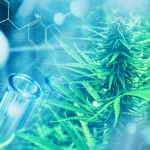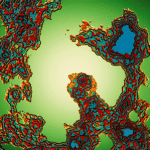Smoking cigarettes is well known to cause lung damage, but this is not only due to smoke. Nicotine in whatever form – even nicotine replacement therapies like a patch – causes lung inflammation and fibrosis by activating acetylcholine receptors.
Polish scientists recently examined how the endocannabinoid system fits into the picture. Activating the CB2 receptor ameliorated nicotine-induced fibrosis, while blocking the receptor exacerbated the problem. Fibrosis involves the accumulation of a protein called collagen between cells. This ultimately impairs the absorption of oxygen in the lungs. CB2 activation slowed the differentiation or migration of a major collagen-releasing immune cell (the myofibroblast) to the lungs. This is one of many studies indicating that CB2 agonists – in some cases – will reduce fibrosis. The endocannabinoid system is bidirectional, however. Sometimes cannabinoids can worsen fibrosis, particularly CB1 agonists in the kidneys and liver.
Read study: CB2R agonist prevents nicotine induced lung fibrosis
Adrian Devitt-Lee is a research scientist and longtime Project CBD contributor. © Copyright, Project CBD. May not be reprinted without permission.







